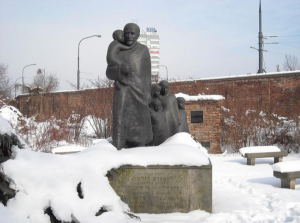Jewish Cemetery – Janusz Korczak

Photo pansy_burke
Henrik Goldszmit (Janusz Korczak) was born in Warsaw in 1878. Pediatrician, educator, and successful author, he abandoned his career in the private sector in 1912 to focus on orphanages. He chose to dedicate his life to children so they could be recognized and respected, no matter their situation and without religious affiliation.
“The suffering of children is not minor. Let’s help them, listen to them! ” Janusz Korczak
His path and career
Henrik Goldszmit was part of a wealthy family of the Jewish intelligentsia, but at age 12 they were ruined by costs related to keeping his father in a psychiatric facility. At this point, Goldszmit began to work to support the needs of his family.
Beginning in 1900, he took up the pseudonym of Janusz Korczak. Acclaimed by educators and parents around the world, his works “How to Love a Child” (1918) and “King Matt the First” (1928) have been translated into twenty-seven languages. The Polish Academy of Literature granted him its highest distinction for his collection of literary work (1937).
It was a radio program, “The Natterings of an Old Doctor,” that made him famous. A journalist and intellectual from Warsaw, Halina Bortnowska, stated: “We had the impression that he was talking to us personally. He told us what our rights were, that we were just as important as our parents.”
In 1906, Janusz Korczak began work in a hospital where he applied some of his theories. In particular, he authorized children to play with toys in the institution. Although he made himself a name as a doctor and author, he abandoned his career to found an orphanage with the help of Stefania, a young woman who would remain by his side all her life and manage the orphanage in his absence.
The application of children’s rights in the orphanages
Janusz Korczak put his ideas on children’s rights into practice: the organization of the orphanage was similar to a republic and had a revolutionary dimension to it. In fact, “the children’s republic” included general meetings presided over by a child, a system of rewards and punishments, a parliament, a tribunal, and a newspaper. The goal of this system was to create an atmosphere of respect and also to educate them in democracy and participation. Janusz Korczak’s two orphanages organized as republics (“Dom Sierot,” created in 1912, and “Nasz Dom” in 1919) are still referenced in education materials. However, his life remains largely unrecognized.
In 1928, he published one of his major works, “A child’s right to respect.” What he was calling for from the end of the 19th century would eventually become the International Convention on the Rights of the Child, established in 1989 thanks to recognition of the positive rights of children (rights to expression, participation, and association). For Janusz Korczak, a child is—beyond the legal definition—a grown person like any other who is not respected by society (“An infant does not become a man, he already is one”). For him, children were to be treated as partners and friends. They should be respected and loved. Thus, the Korczak education system rested on the principle of self-management and creation of a stimulating atmosphere within a family or an institution taking the place of a family.
His death in a concentration camp
This great, indefatigable man would spend his life attempting to have the needs and rights of children respected. Between 1912 and 1942, his personal life and that of his orphanage were indivisible. But what has been noted in memoirs is less his socio-academic efforts than the fact that he remained at the side of 200 children in the Warsaw ghetto. Refusing to abandon them, he died for his ideas in the Treblinka concentration camp on August 6, 1942. It would be his ultimate battle against barbarism. Bruno Bettelheim said this about him: “The fact that Korczak would have voluntarily given up his life for his convictions speaks for the greatness of the man. But this is insignificant compared to the strength of his message.”
As Janusz Korczak noted: “It is inadmissible to leave the world in the state in which one found it.” The fight for children’s rights remains necessary for as long as they remain disrespected in any country.
References:
http://www.franceculture.fr/emission-sur-les-docks-champ-libre-11-%C2%AB-janusz-korczak-la-parole-est-aux-enfants-%C2%BB-2013-04-25
http://www.korczak.fr/
L’œuvre pour la jeunesse de Janusz Korczak, Maggy Rayet , Lectures, 2005
Janusz Korczak, le roi des enfants, Betty Jean Lifton, Laffont, 1989
Korczak, film 35 mm, Allemagne, 114mn, 1990, de Andrzej Wajda
Written by: Virginie Hoarau Translated by: Carolyn Yohn Proofread by :Josephina Worrall |

